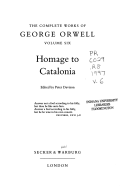Quotes from book
Homage to Catalonia

Homage to Catalonia is George Orwell's personal account of his experiences and observations fighting for the Republican army during the Spanish Civil War. The war was one of the shaping events on his political outlook and a significant part of what led him to write, in 1946, "Every line of serious work that I have written since 1936 has been written, directly or indirectly, against totalitarianism and for Democratic Socialism, as I understand it."

“Human beings were behaving as human beings and not as cogs in the capitalist machine.”
Homage to Catalonia (1938)

“I have the most evil memories of Spain, but I have very few bad memories of Spaniards.”
Homage to Catalonia (1938)

“Everyone always did miss everyone else in this war, whenever it was humanly possible to do so.”
Homage to Catalonia (1938)

“There are occasions when it pays better to fight and be beaten than not to fight at all.”
Charles Dickens (1939)
Source: Homage to Catalonia

Homage to Catalonia (1938)
Context: The workers' militias, based on the trade unions and each composed of people of approximately the same political opinions, had the effect of canalizing into one place all the most revolutionary sentiment in the country. I had dropped more or less by chance into the only community of any size in Western Europe where political consciousness and disbelief in capitalism were more normal than their opposites. Up here in Aragón one was among tens of thousands of people, mainly though not entirely of working-class origin, all living at the same level and mingling on terms of equality. In theory it was perfect equality, and even in practice it was not far from it. There is a sense in which it would be true to say that one was experiencing a foretaste of Socialism, by which I mean that the prevailing mental atmosphere was that of Socialism. Many of the normal motives of civilized life--snobbishness, money-grubbing, fear of the boss, etc.--had simply ceased to exist. The ordinary class-division of society had disappeared to an extent that is almost unthinkable in the money-tainted air of England; there was no one there except the peasants and ourselves, and no one owned anyone else as his master. Of course such a state of affairs could not last. It was simply a temporary and local phase in an enormous game that is being played over the whole surface of the earth. But it lasted long enough to have its effect upon anyone who experienced it. However much one cursed at the time, one realized afterwards that one had been in contact with something strange and valuable. One had been in a community where hope was more normal than apathy or cynicism, where the word 'comrade' stood for comradeship and not, as in most countries, for humbug. One had breathed the air of equality. I am well aware that it is now the fashion to deny that Socialism has anything to do with equality. In every country in the world a huge tribe of party-hacks and sleek little professors are busy 'proving' that Socialism means no more than a planned state—capitalism with the grab-motive left intact. But fortunately there also exists a vision of Socialism quite different from this. The thing that attracts ordinary men to Socialism and makes them willing to risk their skins for it, the 'mystique' of Socialism, is the idea of equality; to the vast majority of people Socialism means a classless society, or it means nothing at all. And it was here that those few months in the militia were valuable to me.

Homage to Catalonia (1938)
Context: The fat Russian agent was cornering all the foreign refugees in turn and explaining plausibly that this whole affair was an Anarchist plot. I watched him with some interest, for it was the first time that I had seen a person whose profession was telling lies — unless one counts journalists.